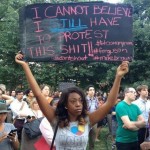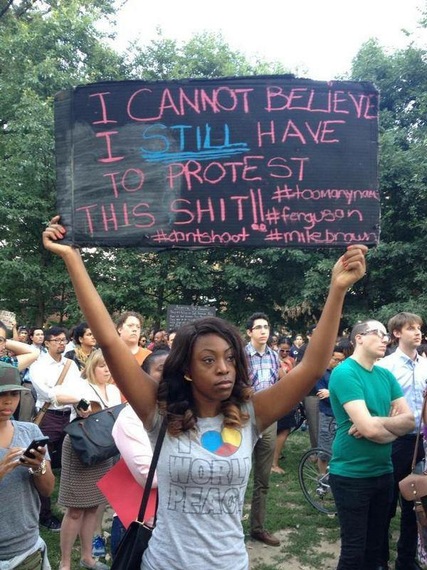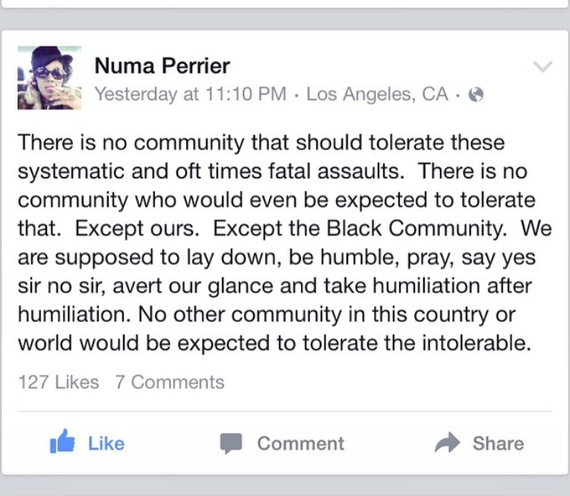
There’s a song I remember from childhood in church that asks a series of questions. Never clear if the questions are to God, to self, or to fellow believers, the lyrics ask questions from the heart. The heart posits: Is my living in vain? Is my giving in vain? Is my praying in vain? Is my fasting in vain? Am I wasting my time? Can the clock be rewind? Have I let my light shine? Have I made 99? Again this morning, I woke up with Baltimore weighing heavily on my heart. Yes, Baltimore, MD, and Freddie Gray — but more than that I mean #Baltimore. And #Ferguson. And all of the other isolated, hashtagged movement-inciting moments in recent (and not-so recent) history …
There’s a song I remember from childhood in church that asks a series of questions. Never clear if the questions are to God, to self, or to fellow believers, the lyrics ask questions from the heart. The heart posits:
Is my living in vain?
Is my giving in vain?
Is my praying in vain?
Is my fasting in vain?Am I wasting my time?
Can the clock be rewind?
Have I let my light shine?
Have I made 99?
Again this morning, I woke up with Baltimore weighing heavily on my heart. Yes, Baltimore, MD, and Freddie Gray — but more than that I mean #Baltimore. And #Ferguson. And all of the other isolated, hashtagged movement-inciting moments in recent (and not-so recent) history that somehow simultaneously tell the stories of a specific modicum of time, provide a snapshot of more overarching issues affecting a marginalized community, and offer context to the narrative of state-sanctioned violence against Black bodies that continues to happen in this country we love to hate and hate to love — because it so often reminds us that the feeling is mutual.
I find myself scrolling through my Newsfeed or Timeline and seeing outcries from like-minded people wanting to see the end of stories like Rekia’s. I hear time and time again calls for ends to violence against Black bodies. I see photos of protesters that shouldn’t be necessary in 2015, my favorite of which is of a protester in Ferguson holding high a sign reading, “I cannot believe I still have to protest this shit!! #dontshoot #toomanynames #ferguson #mikebrown.”
Year after year, murder after murder, non-indictment after non-indictment, “not guilty” verdict after “not guilty” verdict, injustice after injustice I find myself tired. Tired of being frustrated, tired of being angry, tired of fighting the fight (in often passive ways, while armed with my keyboard, words and expression of thoughts).
I’m tired of trying to explain to white people, to uninformed people, or otherwise differently-perceiving people why I’m tired. I’m tired of having to say “I don’t condone the violent uprising, but I certainly understand.” I’m tired of hearing about the other ways we can handle frustrations with the current systems in place.
A friend of mine, the outstanding Numa Perrier, co-founder of Black&SexyTV and actress known for her role on The Couple, recently wrote about how no other group of people is asked to grin and bear it like Black people are. “We are supposed to lay down, be humble, pray, say ‘Yes, sir,’ ‘No, sir,’ avert our glance and take humiliation after humiliation. No other community in this country or world would be expected to tolerate the intolerable,” she wrote. No other section of society is told to take it on the chin and say “Yes, sir, “No, sir,” while avoiding the eye contact with the police officer. No other group has come from being legally less than human to now struggling, pleading to be heard when we say our lives matter armed with a hashtag.
I’m exhausted by having to explain that yes, “looting and rioting” are bad, and broken windows and fires aren’t solutions — but it’s in response to much more. For decades, centuries even, Black people have endured systemic oppressions, the ones I’ve experienced personally or that we all witness from a third-person perspective:
Workplace discrimination that manifests itself in multiple ways: From not being considered for interviews (let alone hired) despite having the requisite qualifications, to getting a job and finding you’re the only person in the room that looks anything like you, all the while being treated unfairly, unprofessionally and uncharacteristically for someone of your title or experience. Not to mention major income inequalities and largely disproportionate unemployment rates in communities of color.
The gentrification and redistricting of neighborhoods to disenfranchise Black voters and diminish our representation in government, our access to voting rights, all while curtailing privileges like simply having decent places to live.
Hate crimes from lynchings in the past (and possibly in the last month or so), to incidences like James Byrd being dragged behind a truck on gravel for miles, to (what at least feels like) state-sponsored killing of unarmed Black people in the streets for jaywalking or walking in a neighborhood that you live in, but looking suspicious because you’re wearing a hoodie. That doesn’t even take into account the indoctrinated criminalization of Black and brown people that so often leads to police brutality because officers “fear for their lives” even when approaching the most simple of encounters. Oh, and over-policing of Black neighborhoods, disproportionate incarceration rates and over-sentencing of Black people.
Negative, under- and mis-representations in media from the way news organizations tell the stories of the “riots” happening in Baltimore juxtaposed against how we word similar actions of white college students tearing apart their city, burning buildings, turning over their cars because their home team lost a tournament. We, the media, do a sucky job of telling the stories as they’re happening and often tell the stories as people are most interested and engaged when reading them. We’re often guilty of under-covering the peaceful demonstrations like the 10,000 people in Baltimore who gathered to honor Freddie Gray and to protest police brutality — yet when a handful (by comparison) of people misbehave in the streets the coverage of it is long-lasting and widespread. Decisions like that disproportionately depict the entire city as something it may not necessarily be, rather than providing the full scope of the context to be more accurate in reporting.
There are so many other injustices Black people face every single day as a result of America’s view of blackness, and when we as a people don’t know what else to do to get out from under the thumb of these oppressions and break a window to be heard — we’re the problem? Something’s afoot.
So then, I ask myself if there’s even any value in my pain, frustration or trying to use my voice. Is there any point in trying to engage my fellow American in dialogue that can bring about awareness? Should I even waste my breath trying to explain to you why Black people are sick and tired of being sick and tired?
Is my living in vain?
Is my giving in vain?
Is my praying in vain?
Is my fasting in vain?Am I wasting my time?
I hope not.
— This feed and its contents are the property of The Huffington Post, and use is subject to our terms. It may be used for personal consumption, but may not be distributed on a website.
See more here:























